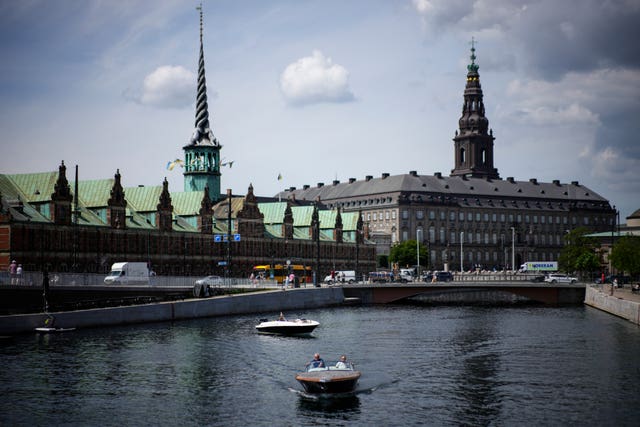
Danish police said on Tuesday that they are closing the investigation into the devastating fire which destroyed more than half of Copenhagen’s Old Stock Exchange, saying there has been nothing to indicate the blaze was the result of a criminal act.
Despite extensive forensic investigations, review of surveillance and the questioning of a large number of witnesses, “it is not possible to determine the cause of the fire in the historic stock exchange building”, said Brian Belling, the Copenhagen police officer in charge of the inquiry.
“Our assessment is that we have explored all relevant investigative possibilities in the case,” he said, adding that no-one has been charged in the case.

Early in the morning of Tuesday April 16, flames tore through the 400-year-old building, a major tourist attraction. The blaze toppled its green copper roof and famous dragon-tail spire. Two days later, a large section of the building’s outer wall collapsed inwards.
As the fire raged, many, including ordinary people, ventured in to save artworks and around 90% of the cultural objects were rescued from the building.
The fire is believed to have started on the roof, which had been wrapped in scaffolding because of ongoing renovation work to be completed for its anniversary in 2024.
On September 24, King Frederik X of Denmark laid the “foundation stone” within part of a red brick wall that survived the blaze, marking the start of a years-long reconstruction plan.
The owner of the central exchange, Denmark’s Chamber of Commerce, has said it will rebuild the landmark, which is considered a leading example of Dutch Renaissance style. Construction started in 1615 and it first opened in 1624.
The fire was reminiscent of the April 2019 blaze at the 800-year-old Notre Dame Cathedral in Paris.


Why are you making commenting on The National only available to subscribers?
We know there are thousands of National readers who want to debate, argue and go back and forth in the comments section of our stories. We’ve got the most informed readers in Scotland, asking each other the big questions about the future of our country.
Unfortunately, though, these important debates are being spoiled by a vocal minority of trolls who aren’t really interested in the issues, try to derail the conversations, register under fake names, and post vile abuse.
So that’s why we’ve decided to make the ability to comment only available to our paying subscribers. That way, all the trolls who post abuse on our website will have to pay if they want to join the debate – and risk a permanent ban from the account that they subscribe with.
The conversation will go back to what it should be about – people who care passionately about the issues, but disagree constructively on what we should do about them. Let’s get that debate started!
Callum Baird, Editor of The National
Comments: Our rules
We want our comments to be a lively and valuable part of our community - a place where readers can debate and engage with the most important local issues. The ability to comment on our stories is a privilege, not a right, however, and that privilege may be withdrawn if it is abused or misused.
Please report any comments that break our rules.
Read the rules here